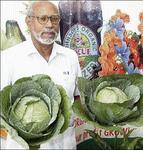
JIS
David Trottman proudly holds two unusually large cabbages grown on his St Andrew backyard farm using organic fertiliser.
Shelly-Ann Harris, JIS Writer
David Trottman has not bought pepper or any other vegetable produce in 10 years. The hike in the price of certain food items such as cabbage, cucumber, tomato and other kitchen must-haves do not bother him in the least, since he grows most of these on his backyard farm in St Andrew.
Moreover, Trottman is not feeling the pinch of soaring synthetic fertiliser prices because he uses a local organic brand, which he says is healthier and goes for less than half the price.
This experienced backyard farmer said growing his own food was quite satisfying and that he had seen several benefits as a result of using organic fertiliser.
Crops larger, healthier
He boasted that his vegetable crops were much larger and healthier now that he's using organic compounds to enrich his backyard farm.
"Where I live is a clay area and I've found that the Rescue Fertiliser (a local organic brand) gives you much larger produce ... . You see and taste the difference when you use the organically grown stuff," he shared enthusiastically.
Trottman has proven over and over that ordinary consumers can play a role in their own food security by planting a few vegetable crops. According to the Ministry of Agriculture, you can save approximately $12,000 per year by doing this.
"So all of us can be farmers in our own right. We can grow what we eat and we need to get our hands dirty and get on with it," said Trottman, with the air of a man who knows.
No unpleasant elements
Zephaniah Kellerman, a small farmer from Paul Mountain in St Catherine, can also attest to the benefits of using organic fertiliser. Kellerman, who grows broccoli, cauliflower, cucumber and other vegetable crops, previously used raw manure to enrich the soil on his hilly farmland.
But with the relatively new Rescue Fertiliser brand on the market, he can continue to provide organic produce without the unpleasant elements.
"One of the benefits is, I don't have any smell and flies like when you use the manure raw ... and the people I sell to are conscious of their health and they say it's a better product. So I get good market because of the product that I use," Kellerman explained.
Senior nutritionist in the Ministry of Health, Sharon Dawson, concurs with the farmers' findings, saying the use of organic fertiliser does result in tastier foods with improved texture.
"If you grow a tomato using artificial fertiliser and another using organic fertiliser, some studies suggest that the one grown with organic fertiliser has more nutrients. There are also studies that indicate that the human body processes the nutrients from organically grown foods better," the nutritionist explained.
Nutritionists' preference
Dawson, however, cautions that there are other studies with findings that support the benefits of using inorganic fertiliser. Still, she said most nutritionists lean toward the use of organic fertiliser.
Besides yielding a healthier product, some farmers are keeping more money in their pockets by using organic fertiliser.
"Before there was a subsidy on fertiliser, we had to fork out $3,000 to get some. This $3,000 could give me a load of organic," said Kellerman.
Now that he is using the standardised Rescue Organic Fertiliser, he is still cutting costs as one bag goes for approximately $1,300.
Since December 2006, synthetic fertiliser prices have more than doubled; a trend which serves to nullify the subsidies being provided by the Government. In fact, Government has already spent $100 million to subsidise prices since most commercial farmers use the imported synthetic variety.
This is part of why the agriculture ministry is looking for more sustainable and affordable solutions. Already, through the Rural Agricultural Development Authority (RADA), steps are being taken to ensure that the use of organic fertiliser takes root.
Education programme
Agriculture Minister Dr Christopher Tufton said, "The Government will be embarking on a farmer-education programme to expose end users to more efficient use of fertiliser, as well as alternatives to chemical fertilisers, such as organic blends."
RADA will drive this programme through a series of training sessions at the parish level, and a public education campaign.
Kellerman and other small farmers are already benefiting from the ministry's new thrust to re-educate farmers on fertiliser use.
"I get assistance from the RADA people who taught me how to use it," said Kellerman.
Shift encouraged
Meanwhile, president of the Jamaica Agricultural Society, Senator Norman Grant, strongly encourages the shift towards using organic fertiliser, saying that it contributes to the profitability of farmers by ensuring that farms remain fertile for many years, "because you are really putting back in the soil what has been taken out and it's a complement rather than a hostile relationship."
"With the cost of fertiliser increasing at a rapid rate on a global level, it is indeed prudent and certainly profitable to consider organic fertiliser as a favourable option," Grant stressed.
Johnson's Organic Fertiliser Company in Kitson Town, St Catherine, produces Rescue Organic Fertiliser, the most notable brand to date. The product has been on the market for three years and is made from natural raw materials including animal waste.
This is a special Gleaner feature in collaboration with the Jamaica Information Service.

